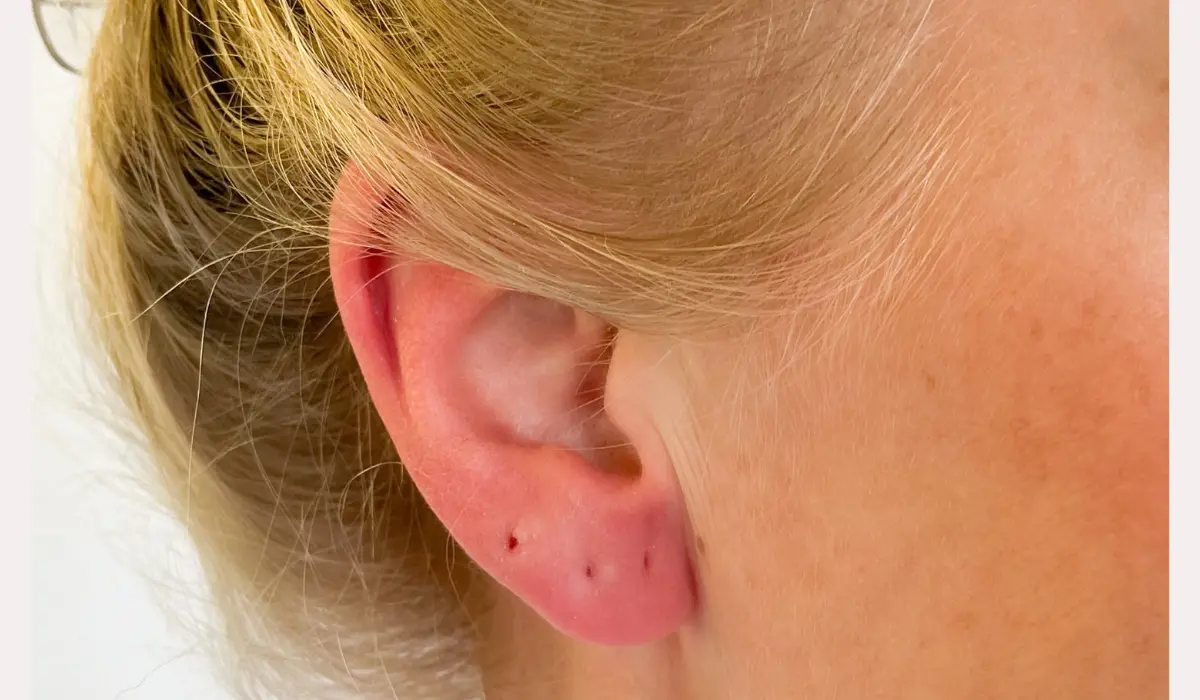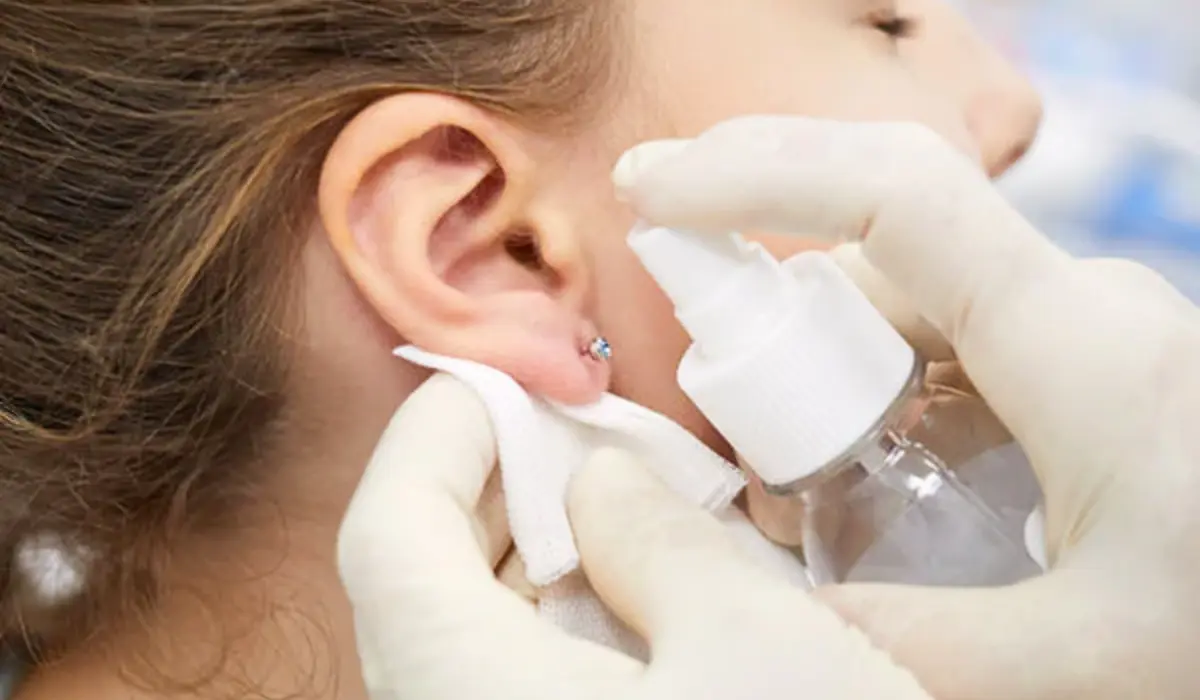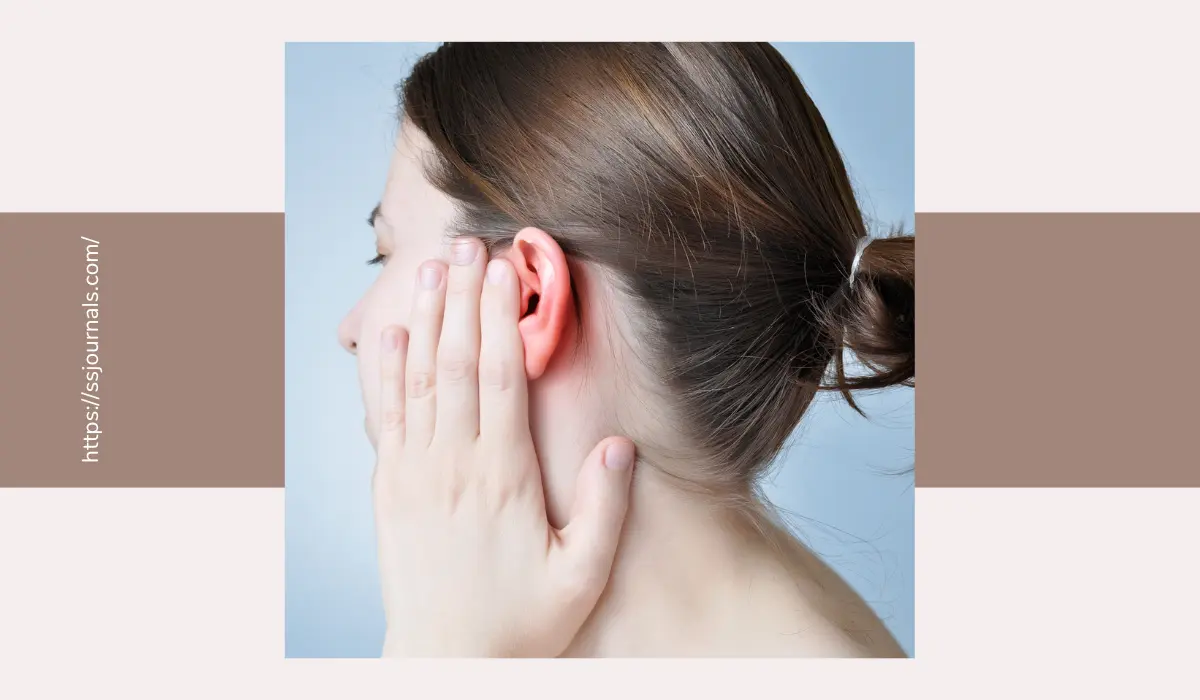Ear piercings are a popular way to accessorize, but sometimes they can get infected. An infected ear piercing is characterized by pain, redness, swelling, drainage, and warmth around the pierced area. If left untreated, the infection can spread and cause serious complications. This article will discuss the causes, types, symptoms, risk factors, and natural remedies for infected ear piercings.
Defining An Infected Ear Piercing
An infected ear piercing refers to inflammation and irritation of the pierced skin site, usually due to bacterial contamination. It often presents with the discharge of yellow-green fluid containing pus, redness, swelling, tenderness, and warmth around the piercing. The surrounding skin may look inflamed. If the infection worsens, it can spread into deeper tissues like cartilage or lymph nodes.

Causes Of Ear Piercing Infections
Ear piercings can become infected due to:
➜ Unhygienic piercing procedures using unsterilized equipment
➜ Poor aftercare allows bacteria to enter such as touching with unwashed hands
➜ Trauma that introduces new bacteria
➜ Using low-quality jewelry that harbors microbes
➜ Pre-existing skin conditions like dermatitis
Infected Ear Piercing: Common Signs And Symptoms
Common signs and symptoms of an infected ear piercing include:
👉 Redness, heat, swelling, and pain around the piercing
👉 Green, yellow, or foul-smelling discharge
👉 Hot, throbbing sensation
👉 Itching or bleeding from the piercing
👉 Raised bumps on the skin near the piercing
👉 Lymph node swelling near the infected area
👉 Feeling unwell like fatigue or fever may indicate a worsening infection
Types Of Infected Ear Piercing
🔹 Bacterial Infections
The most common type of infection is caused by microbes like staphylococcus or pseudomonas bacteria entering the wound. Presents with classic symptoms of redness, pus, and swelling.
🔹 Yeast Infections
Caused by fungal overgrowth of Candida yeast naturally found on the skin. Signs include itchy, red irritation and white cottage cheese-like discharge. More common in those with weakened immunity.
🔹 Allergic Reactions
Some people may be allergic to certain metals in ear jewelry like nickel. This causes a rash, bumps, oozing, and crusting around the piercing.
🔹 Embedded ear piercings
Swollen, overgrown skin swallowing part of the jewelry indicates an embedded piercing. This blocks drainage leading to infection risk.
Factors That Increase Ear Piercing Infection Risks
❖ Unclean piercing equipment or environment
❖ Poor hygiene practices like touching new piercings with dirty hands
❖ Using low-quality jewelry including nickel or plastic
❖ Getting a piercing when immunity is lowered by illness
❖ Failure to complete a full antibiotic course earlier
❖ Playing with or moving the piercing excessively
❖ Trauma like pulling the piercing or hair getting wrapped around it
❖ Pre-existing skin conditions like eczema or dermatitis
❖ Swimming or exposing new piercings to dirt or sweat
How To Cure Ear Piercing Infections Naturally?

Treating an infected ear piercing usually involves keeping the area clean and using antibiotic creams or ointments.
1. Apply a warm compress to stimulate drainage and blood flow
2. Use antimicrobial essential oils like tea tree oil or oregano oil
3. Make a sea salt solution and rinse the infected area 1-2 times per day
4. Take over-the-counter pain relievers like acetaminophen or ibuprofen for pain and swelling
5. Apply topical antibiotic creams containing neomycin or mupirocin
For moderate to severe infections, consult a doctor for possible oral antibiotics or antifungals. Never remove the jewelry until fully healed as this can trap the infection inside. Proper aftercare and hygiene prevent most ear-piercing infections.
Conclusion
While infected ear piercings are common, following proper sterilization protocols, aftercare, and hygiene can reduce infection risk. Seeking prompt treatment at the first signs of infection prevents complications. Most ear-piercing infections resolve quickly with simple home remedies and over-the-counter medicines. However, recurrent or worsening infections need medical management. Practicing caution allows you to safely adorn your ears with piercings and enjoy the stylish look.
FAQs
Q1. How long does an infected ear piercing take to heal?
A1. With proper care and treatment, most minor ear piercing infections resolve within 1-2 weeks. More severe infections may take 3-4 weeks to fully heal.
Q2. Can you change the earring during an infection?
A2. It is not recommended to change the jewelry until the infection has completely cleared, as removing or changing it can reintroduce bacteria.
Q3. When should you see a doctor for an infected ear piercing?
A3. Seek medical care if symptoms worsen or persist beyond 2 weeks despite home treatment. Also if you have an elevated fever, pus-filled blister, or spreading redness.
Q4. What is the best solution for cleaning infected ear piercings?
A4. A warm saltwater solution made with 1⁄4 teaspoon salt dissolved per cup of warm distilled or bottled water is gentle and effective. Use 2-3 times daily.
Q5. Can you get an infected cartilage or nose piercing?
A5. Yes, cartilage and nose piercings can also become infected. Seek prompt treatment as cartilage infections can progress quickly.

